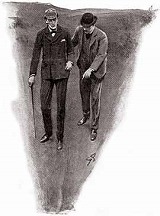We did so, and at the end of a few hundred yards lost the tracks as we emerged from the boggy portion of the moor. Following the path backwards, we picked out another spot, where a spring trickled across it. Here, once again, was the mark of the bicycle, though nearly obliterated by the hoofs of cows. After that there was no sign, but the path ran right on into Ragged Shaw, the wood which backed on to the school. From this wood the cycle must have emerged. Holmes sat down on a boulder and rested his chin in his hands. I had smoked two cigarettes before he moved.
“Well, well,” said he, at last. “It is, of course, possible that a cunning man might change the tyres of his bicycle in order to leave unfamiliar tracks. A criminal who was capable of such a thought is a man whom I should be proud to do business with. We will leave this question undecided and hark back to our morass again, for we have left a good deal unexplored.”
We continued our systematic survey of the edge of the sodden portion of the moor, and soon our perseverance was gloriously rewarded. Right across the lower part of the bog lay a miry path. Holmes gave a cry of delight as he approached it. An impression like a fine bundle of telegraph wires ran down the centre of it. It was the Palmer tyres.

“Here is Herr Heidegger, sure enough!” cried Holmes, exultantly. “My reasoning seems to have been pretty sound, Watson.”
“I congratulate you.”
“But we have a long way still to go. Kindly walk clear of the path. Now let us follow the trail. I fear that it will not lead very far.”
We found, however, as we advanced that this portion of the moor is intersected with soft patches, and, though we frequently lost sight of the track, we always succeeded in picking it up once more.
“Do you observe,” said Holmes, “that the rider is now undoubtedly forcing the pace? There can be no doubt of it. Look at this impression, where you get both tires clear. The one is as deep as the other. That can only mean that the rider is throwing his weight on to the handle-bar, as a man does when he is sprinting. By Jove! he has had a fall.”
There was a broad, irregular smudge covering some yards of the track. Then there were a few footmarks, and the tyres reappeared once more.
“A side-slip,” I suggested.
Holmes held up a crumpled branch of flowering gorse. To my horror I perceived that the yellow blossoms were all dabbled with crimson. On the path, too, and among the heather were dark stains of clotted blood.
“Bad!” said Holmes. “Bad! Stand clear, Watson! Not an unnecessary footstep! What do I read here? He fell wounded - he stood up - he remounted - he proceeded. But there is no other track. Cattle on this side path. He was surely not gored by a bull? Impossible! But I see no traces of anyone else. We must push on, Watson. Surely, with stains as well as the track to guide us, he cannot escape us now.”
Our search was not a very long one. The tracks of the tyre began to curve fantastically upon the wet and shining path. Suddenly, as I looked ahead, the gleam of metal caught my eye from amid the thick gorse-bushes. Out of them we dragged a bicycle, Palmer-tyred, one pedal bent, and the whole front of it horribly smeared and slobbered with blood. On the other side of the bushes, a shoe was projecting. We ran round, and there lay the unfortunate rider. He was a tall man, full-bearded, with spectacles, one glass of which had been knocked out. The cause of his death was a frightful blow upon the head, which had crushed in part of his skull. That he could have gone on after receiving such an injury said much for the vitality and courage of the man. He wore shoes, but no socks, and his open coat disclosed a nightshirt beneath it. It was undoubtedly the German master.